Opened in January 2013, this 10 million facility in Danks Way, Tipton is a hive of activity, with 100 vehicles offloading waste and recyclables daily and a further 20 transporting the material to treatment facilities around the country.
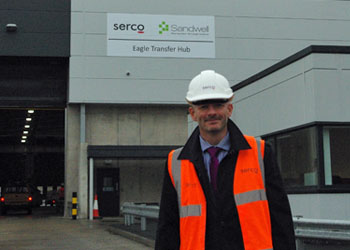
The transfer station forms the centrepiece of a 25-year collection contract with Sandwell metropolitan borough council, worth 650 million which also includes the operation of the councils household waste and recycling centre and depot. The site also marks the first time the services firm has branched into the operational side of waste facilities.
With a wide ranging portfolio encompassing defence, facilities management and home affairs, it is fair to say Serco has its fingers in many pies. Waste and recycling counts for just one of the many sectors it operates within, however partnership director Jason Holtom says it is a major part of the companys offerings which sees Serco handle the waste and recycling of 14 local authorities.
Serco faced a huge challenge in getting the council-owned Eagle Way site up to scratch. Two coal seams had to be filled along with seven mine shafts relics left behind from the citys mining past accompanied by the removal of asbestos and Japanese knotweed which plagued the site. On top of this, Eagle Way had been earmarked as an unexploded ordnance (UXO) site and in the process of redevelopment four unexploded devices were found luckily they proved to be just shells. Nevertheless, the hard work has paid off, says Mr Holtom and the site is now running efficiently.
Treatment
Recycling is embedded in the sites history having once been used for decommissioning steam trains and tanks. It now sees a range of waste and recycling from Sandwells 129,000 properties and some commercial waste bulked up ready for treatment at other facilities.
The food waste collected is sent to Biffas anaerobic digestion plant in Cannock, Staffordshire, the green waste is composted by Shareshill-based Jack Moody and the mixed dry recyclables are sent to Kiers Ettington materials recycling facility in Warwickshire for sorting.
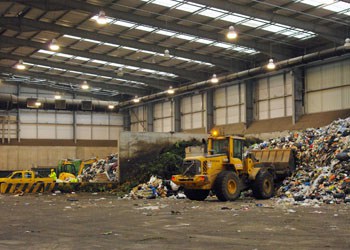
Residual waste is sent for incineration at a number of plants City Waste Disposals plant in Coventry, Enterprises facility in Wolverhampton and Martin Engineering Systems (MES) plants in Dudley and Stoke. However, once Staffordshires W2R project is up and running residual waste will be sent there for incineration.
When asked whether Serco would consider branching into treatment in the future, Mr Holtom says if the conditions were right then they might consider it. He says: I think if the opportunity is there then that is something that would happen. We would have to have the market right, the right price, the right opportunity and the right volume though.
There are opportunities and we look for those and as I say this is our first integrated model so it does lead us onto other areas.
Service changes
Serco collects food waste, dry mixed recyclables and residual waste on a weekly basis and garden waste fortnightly. Mr Holtom says Serco introduced a number of changes to the collections when the service started, including adding food waste and increasing the frequency of recycling from fortnightly to weekly and moving from black sacks to wheeled bins for residual waste.
Mr Holtom says the roll-out of the changes was relatively smooth and there were hardly any issues with residents. We have never taken anything away, says Mr Holtom, We have always retained weekly services so that has been positive. He adds that communication is key to making these things go smoothly.
Contamination
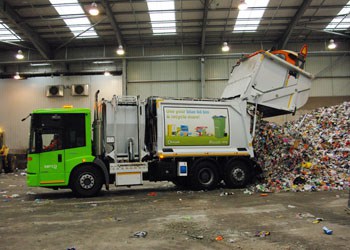
This is something which Serco is utilising to tackle the contamination of dry recyclables. While it has made good progress in increasing the boroughs recycling rate from 32% in 2010/11 to 47.9% in 2012/13, Mr Holtom acknowledges that contamination poses a continual challenge.
Serco collects paper and cardboard, cans, cartons, plastic packaging, plastic bags and glass in a 240 litre blue-lidded wheeled bin. While glass can have a detrimental effect on the paper, Mr Holtom says it accounts for a substantial amount of the material collected.
Mr Holtom says: Quality will always be an issue especially with a mixed collection scheme because you cant see everything that is in there and we can only do a visual check. We are constantly looking at how we can improve the quality of the product. We need to make sure people are putting the right things in the right bins.
Discussing the contamination problems the partnership is facing, he says: We have got pockets of contamination there are different areas where we have more contamination than others. There is a demographic. He adds: The contamination of mixed dry recyclables is one that we are constantly challenging to get better.
There is quite a lot of paper and card in residual waste and that is what we have got to do over the next few years and change peoples habits.
With 123 languages spoken in Sandwell, communicating is no easy task and Mr Holtom says they may consider using other languages in the future. In the meantime though, he says it is important to keep communication simple and very visual.
Hangers are placed on contaminated bins to highlight to residents that items which cannot be recycled were found in the bin. Describing Sercos other work in this area, Mr Holtom adds: We are looking at doing samples from individual rounds and we have got waste awareness officers which have used the data from collection crews to knock on doors and talk to members of the public. There is a lot of front end communication.
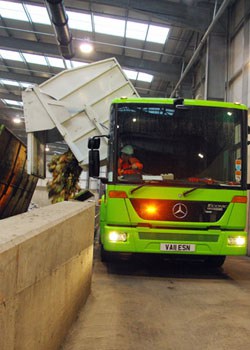
Another challenge facing Serco and Sandwell is food waste, according to Mr Holtom, who says: Food waste for us is a big challenge. The big challenge is getting more of it. We have got a steady level of participation but we need to increase that and we need to get people into food waste collection.
Mr Holtom adds that while participation rates remain steady there has been a reduction in the amount of food waste collected. This was attributed to a reduction in the amount of food wasted by householders participating in the scheme.
Recycling rates
We have taken huge steps so far in terms of the overall recycling rate but there is still work to be done and we definitely need to keep pushing forward, says Mr Holtom.
He believes lots of little changes will have a positive result on the boroughs recycling rate. For example, changing peoples habits and ensuring bottles from the bathroom make it to the recycling bin.
The drive to get more recycling is to involve the community more. It really is about education and awareness of what we can do.
One way Serco is involving the community is through the use of the Eco bus which tours schools in the city, educating students about the benefits of recycling. In addition, Serco has recently launched the Go Green Reward Scheme which sees up to 270,000 available for rewards payments to communities over the next two years. Funds will be made available for use in the community and at nearby schools if recycling rates in the area increase over a four month period compared to the same period the year before.
Partnership working
The success seen by Serco in Sandwell is partly due to the close partnership with the council, which includes a shared office, says Mr Holtom. Describing the benefits of this arrangement, he says: It is a partnership all the way through from the top from board level all the way down to campaign officers and contract managers. Everybody is working on the same thing in the same place and with the same objectives.
Offering advice to other councils and their contractors, Mr Holtom says it is important to make sure both parties agree outcomes and work hard to make sure they are achieved.
Jan Britton, chief executive of Sandwell Council, concludes: “Sandwell’s partnership with Serco is going well.Our recycling and composting rate is pushing towards 50% and the borough’s streets are cleaner. Serco have helped us to deliver a transformation from the 1970s service we had five years ago that we could not have achieved on our own.Our costs are below what we forecast and eight out of ten residents rate the waste, recycling and cleansing services as good or better.Along the way Serco have also invested in a new waste transfer station, which Sandwell has not had before, and upgraded our household recycling centre.This feels like success to me.





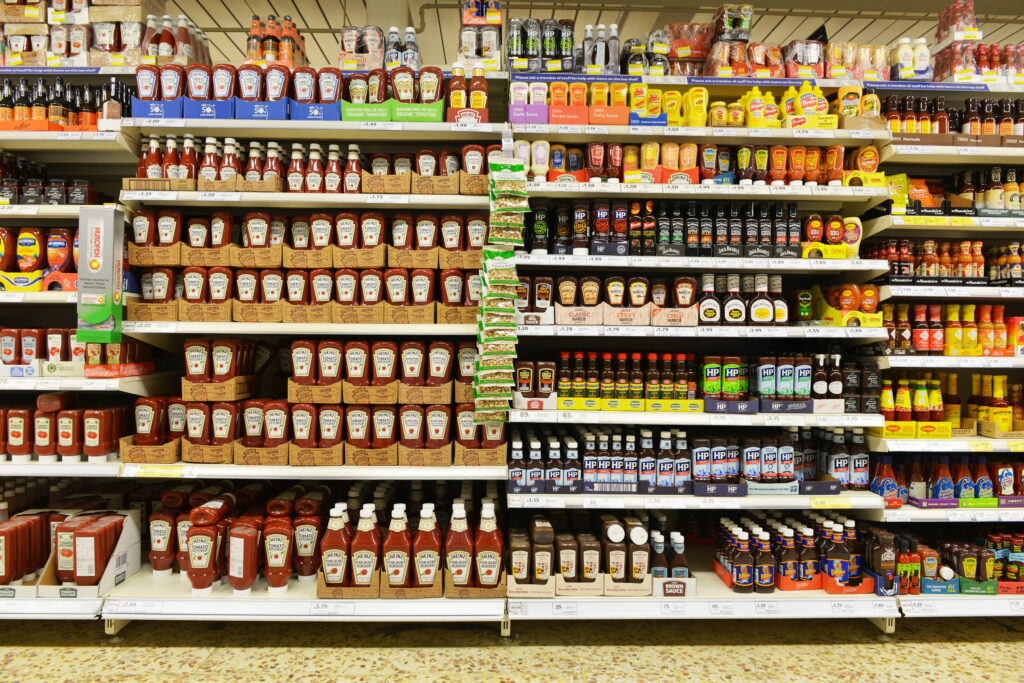

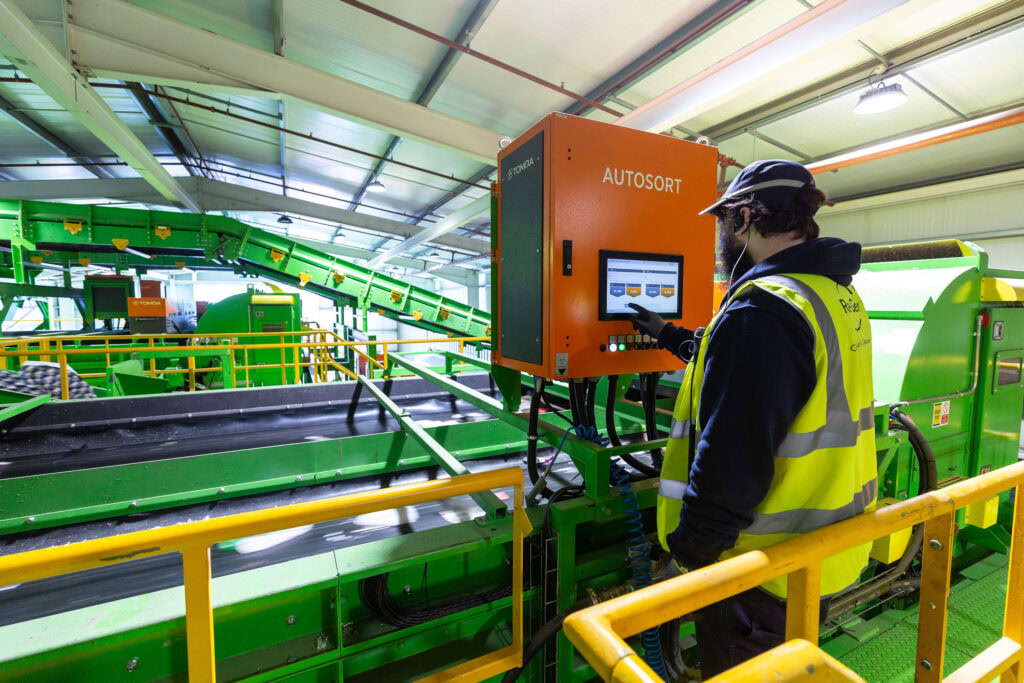

Subscribe for free